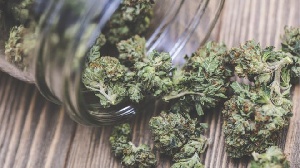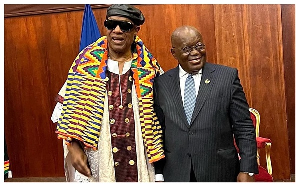Opinions of Tuesday, 2 April 2024
Columnist: Wilson Otchie
Cannabis in Ghana: The green gold - My reflections
Cannabis sativa, or simply Cannabis (aka Marijuana, Indian hemp, Weed, Ganja, Pot, Dope), which is often seen as both a blessing and a curse, has sparked heated debates worldwide.
On the one hand, some see Cannabis as harmful and addictive, while on the other hand, others point to its potential therapeutic benefits backed by research. I've never used cannabis, nonetheless, I can't help but feel that its criminalization is biased and unjust to humanity and nature.
Listening to iconic reggae legends like Bob Marley, Joseph Hill (Culture) and Peter Tosh advocate for its legalization in songs like "Legalize Marijuana" adds another angle to the discussion.
Consequently, my reflections on the evolving narrative surrounding cannabis are deeply rooted in both global trends and local realities, particularly in Ghana.
Over the years, I've observed significant shifts in attitudes towards cannabis use, from its demonization as a dangerous substance to its increasing acceptance for medical and recreational purposes worldwide. Thus, the journey of cannabis legalization and normalization is characteristic of broader societal shifts in attitudes towards drugs and individual freedoms.
Globally, there has been a growing recognition of the therapeutic potential of cannabis. Research has highlighted its efficacy in alleviating symptoms of various medical conditions such as chronic pain, epilepsy, and anxiety disorders.
This has led to the legalization of medical cannabis in numerous countries, including Canada, the Netherlands, Australia, several states in the United States, Ghana, and recently, Germany.
Moreover, the legalization of recreational cannabis use in these countries except Ghana, has also shown promising economic benefits. These include tax revenues, job creation, and opportunities for small businesses.
For example, in Colorado, where recreational cannabis has been legal since 2012, the industry has generated billions of dollars in revenue and contributed to economic growth. Hence, the green gold.
In the context of Ghana, cannabis use holds a complex and multifaceted significance. Despite the passage into law by Ghana Parliament in 2023 (for medical and industrial use only), using it for recreational and economic or commercial purposes remains illegal and carries criminal consequences.
Historically, cannabis has been covertly cultivated and used for various purposes in Ghanaian society, including medicinal, cultural, and recreational purposes. However, like many other countries, Ghana has also grappled with prohibitionist policies influenced by international drug control treaties.
Despite its illegal status in terms of recreation and trade, cannabis remains widely available underground and consumed in Ghana, particularly among the youth. Unfortunately, the criminalization and stigmatization associated with the use of cannabis have contributed to social inequalities, with marginalized communities disproportionately bearing the brunt of punitive measures.
Furthermore, the illicit and underground cannabis market perpetuates violence and fuels corruption, exacerbating social and economic challenges in the country.
As attitudes towards cannabis continue to evolve globally, there is an opportunity for Ghana to reassess its approach to drug policy. Not just passing a law only for medical and industrial purposes but also, for commercial and recreational considerations.
By adopting evidence-based strategies that prioritize public health, harm reduction, and social justice, Ghana can address the complex realities of cannabis use while promoting the well-being of its citizens.
From an economic perspective, legalizing and regulating cannabis use, especially for recreation and commerce could unlock a range of economic opportunities for the government, local communities, and individual entrepreneurs. For instance, by taxing the production and sale of cannabis, the government could generate significant revenue, which could be reinvested into public services such as education, healthcare, and infrastructure.
Also, legalizing cannabis cultivation could empower local communities, particularly in rural areas where traditional livelihoods may be under threat. By providing support and training for small-scale farmers, Ghana could foster a sustainable cannabis industry that benefits local economies while preserving cultural heritage and traditional knowledge.
Furthermore, legalizing cannabis could create job opportunities across the value chain, from cultivation and processing to retail and distribution. This could particularly benefit young people, who often face limited economic prospects in Ghana's competitive job market.
However, alongside the economic opportunities, it's essential to address the social and health-related implications of cannabis use. Investing in public education and harm reduction initiatives can help promote responsible consumption and mitigate potential risks, especially among vulnerable populations.
Additionally, Ghana could learn from the experiences of other countries that have legalized cannabis for recreation and commence, implementing measures to ensure equity, social justice, and community development. This could include expunging criminal records for cannabis-related offenses, providing support services for individuals affected by substance abuse, and possibly offering compensation for those unjustly incarcerated.
Eventually, the shifting attitudes towards cannabis reflect broader changes in public opinion, scientific research, and policy approaches to drug regulation.
By embracing evidence-based strategies, countries like Ghana can harness the economic potential of cannabis legalization while addressing the social and health-related challenges associated with its use. As we continue to navigate this evolving landscape, it is essential to prioritize equity, compassion, and evidence-based decision-making to ensure that cannabis policies serve the needs of all in our society.













